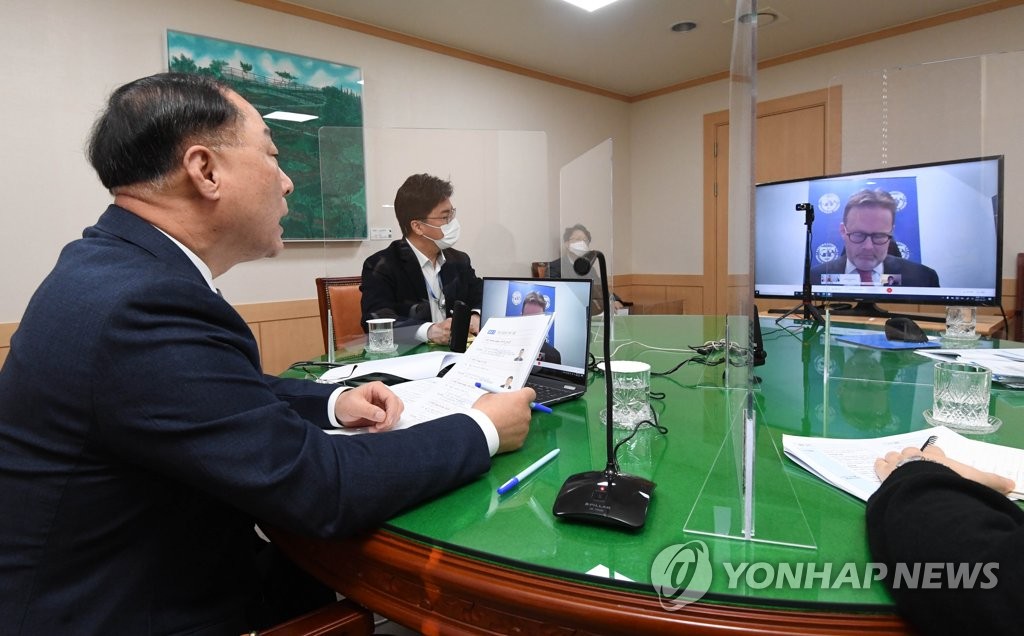Additional fiscal and monetary policy easing advice… “Even if this year’s fiscal deficit increases, it can be offset for years.
“The situation in which short selling in Korea can be resumed… the full ban on short selling comes with a large cost”

(Seoul = Yonhap News) Hong Nam-ki, Deputy Prime Minister of the Economy and Minister of Strategy and Finance, is having an interview with Andreas Bauer, head of the IMF (International Monetary Fund) Korea Mission on the 27th at the Gwanghwamun Government Complex in Seoul, on the results of the annual IMF negotiations. 2021.1.27
[기획재정부 제공. 재판매 및 DB 금지] [email protected]
(Sejong = Yonhap News) Reporter Kwak Min-seo = The International Monetary Fund (IMF) assessed that “additional easing of fiscal and monetary policies will accelerate the pace of economic normalization and help job seekers return to the labor market.” .
According to the Ministry of Strategy and Finance, the IMF made this announcement in the ‘2021 IMF-Korea Annual Meeting Results Announcement’ released on the 28th.
The IMF explained that, along with the downside risks in the economic recovery process, Korea has a significant level of economic slack. Idle economic power refers to the portion of economic production capacity such as industrial production or employment that is not used and remains idle.
The IMF further diagnosed, “There is room for Korea to selectively increase relocation expenditures for workers and companies that are seriously affected (by Corona 19).”
It is believed that there is room for selective support for those affected by the coronavirus.
At an online briefing held today, Andreas Bauer, assistant director of the IMF Asia-Thailand, and the head of the Korean Mission, asked whether compensation for losses for self-employed people was necessary. “Government support should be focused on the areas where the damage is the most. I can see it.”
It is also worth noting that Korea has a relatively large proportion of self-employed people compared to the member countries of the Organization for Economic Cooperation and Development (OECD). “When there is a big impact like Corona 19, it makes sense in many ways to relocate to self-employed people. “He said.
The IMF also evaluated that “even if the size of the fiscal deficit increases slightly compared to this year’s budget, it will be offset through the gradual fiscal consolidation process over the next few years.”
However, the IMF pointed out that the aging issue could be a factor of pressure on Korea’s fiscal balance in the long term.
He said, “We welcome the Korean government’s proposal to operate fiscal policy based on the rules within a medium-term framework.”
As for the national debt ratio, the 60% level suggested by the government through fiscal rules was evaluated as an appropriate level.
![[연합뉴스TV 제공]](https://i0.wp.com/img6.yna.co.kr/photo/cms/2020/10/15/79/PCM20201015000079990_P4.jpg?w=560&ssl=1)
[연합뉴스TV 제공]
The IMF also said, “There is room for additional support to support the economic recovery in the future and to manage the inflation rate closer to the Bank of Korea’s inflation target,” he said. “This can be achieved through additional monetary easing measures.” Advised.
“I think the benefits of additional mitigation measures outweigh the risks,” said Bauer. “A cut in the base rate could be an alternative.”
Regarding the purchase of government bonds by the Bank of Korea, he said, “If the BOK purchases government bonds through the issuance market, the price discovery process may be insufficient.”
In the case of the financial system, overall risk management is properly carried out, but he pointed out that if household debt continues to increase rapidly in the future, the regulatory level needs to be further raised.
Resumption was deemed desirable in relation to short selling, which has recently been controversial.
“In the case of the Korean market, the market stabilization seems to have progressed a lot after the coronavirus, and the economy is also recovering, so I think it is possible to resume short selling,” said Bauer.
He pointed out, “It is important to ensure that all market participants, as well as individual investors, can participate in an equal market, but trying to secure an equal market through a total ban on short selling is a response with a very not sharp tool.”
He emphasized, “(Total ban on short selling) can entail very high costs in terms of market efficiency.”
It was diagnosed that financial support programs for small and medium-sized businesses should also be shifted to measures to increase the viability of companies and promote restructuring in the process of future economic recovery.
The Korean version of the New Deal was evaluated as a welcome strategy in that it secures a new growth engine after the coronavirus.
In addition, the IMF added that the potential growth rate could be further raised by removing some of the rigidity remaining in the current labor market.
The aim is to secure flexibility so that regular workers can be adjusted if necessary while reinforcing the social safety net for the unemployed.
This year, Korea’s real gross domestic product (GDP) growth is forecast to be 3.1%.
The IMF said, “It is likely that the economy will enter a recovery phase, but given the risks related to Corona 19, uncertainty about the future outlook is still high,” said the IMF. “In particular, as the growth rate of the service and domestic sectors lags behind that of the export sector, the recovery will proceed unevenly by sector. “I looked out.
However, this forecast is a provisional estimate that does not reflect real GDP figures for the fourth quarter.
“As Korea’s economic activity in the fourth quarter of last year was quite solid, I think there is a possibility to raise it,” said Bauer. “The final outlook may reflect a slightly raised figure.”
Unauthorized reproduction-redistribution prohibited>
2021/01/28 11:00 sent
